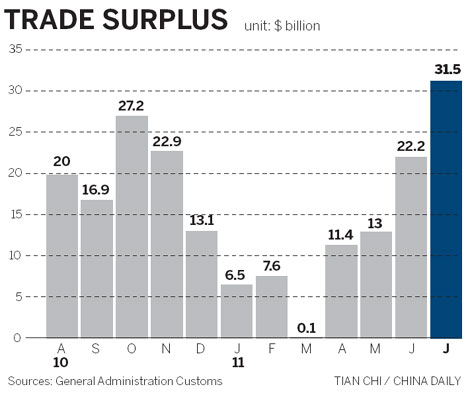-
News >Bizchina
Surplus rises on surprise export surge
2011-08-11 09:06
July figure hits 30-month high of $31.5 b amid 3rd quarter optimism
BEIJING - China's trade surplus for July hit $31.5 billion, the highest in two and a half years, thanks to higher-than-expected export growth, especially to the European Union.
The surplus eased fears that the US and European debt crises might hurt global demand for Chinese goods.
Officials and experts said that they believe export growth will remain robust in the third quarter, driven up by rising orders from overseas ahead of the Christmas shopping season. But it is still too early to predict whether US and European debt woes would hurt Chinese exports in the long term, they said.
China's exports surged 20.4 percent from a year earlier to $175.13 billion in July, a record high, while imports rose 22.9 percent year-on-year to $143.64 billion, according to the General Administration of Customs (GAC).
The July export growth figure shows a sharp rebound from June. During the first half of the year, export growth declined to 17.9 percent in June, from 37.7 percent in January.
"Export growth is better than expected, thanks to Japan's output capacity resuming and EU demand growing rapidly," said Lu Zhengwei, chief economist at Industrial Bank.
The $31.5 billion monthly trade surplus is the highest since February 2009 and has come at a time when the world's largest exporter faces uncertain demand from the US and the EU.
The US Federal Reserve pledged on Wednesday to keep interest rates at a record low until the middle of 2013.
"China's export performance always lags behind a slowdown and weakening demand overseas. So debt problems overseas will not have a negative impact on Chinese exports right now," said Zhang Yansheng, director of the Research Institute of Foreign Economic Relations at the National Development and Reform Commission.
As statistics from the GAC showed, exports to the EU rose 22.3 percent in July, from 11.4 percent in June, and exports to Japan gained 27.2 percent, up from 20 percent in the previous month.
But exports to the US slowed slightly to 9.5 percent from 9.8 percent.
Labor-intensive industries led export growth, as seen by above-average increases in textile exports at 21 percent and garments at 27.1 percent. But the increase in exports of mechanical, electrical and high-tech goods was much slower at about 15 percent.
Han Jie, deputy director-general of the department of commerce in Zhejiang province, attributed July's strong growth to a surge in Christmas orders placed by overseas buyers.
"The third quarter is usually the busiest season, and strong exports could probably be sustained for a few months," he said, adding that the impact of the debt crises is still limited in the short term.
Zhejiang is the third-largest foreign trade region nationally, with volume reaching a record high of $20.9 billion in July. Guangdong and Jiangsu provinces are the two leading trade regions.
A report from IHS Global Insight, a financial and economic consultancy, also sounded upbeat about export prospects.
"Given that most orders for the next few months have already been placed, a drastic downward shift in global sentiment is unlikely to have too big an impact on exports in the short run," it said.
However, officials and experts remain pessimistic over long-term prospects.
"Weaker growth in the US and Europe means weaker export growth for China," Wang Tao, a Hong Kong-based economist for UBS AG, said in a Bloomberg Television interview on Tuesday.
After Standard & Poor's downgraded the US sovereign credit rating, and the European debt crisis showed signs of spreading to Italy and Spain, overseas demand may suffer, research institute director Zhang Yansheng said.
"Enhancing a competitive edge is the most pressing task for Chinese exporters."
Many manufacturers and exporters said that they are not confident of prospects for the second half of this year, citing the rising costs of labor and raw materials, a rising yuan and weakening demand.
As China's inflation rate hit 6.5 percent in July, the highest in three years, the rising cost of raw materials will be a huge burden for exporters and will squeeze their profits, Han said.
China's import growth in July rebounded to 22.9 percent, from 19.3 percent in June, "partly driven by the government's lowering import duties for major commodities from July 1", the IHS report said.
Despite the slowdown in China's economic growth, "imports will outperform exports in the coming months", UBS economist Wang said.
